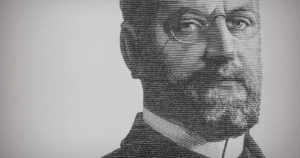
The Credo Fellow Bookclub with Adonis Vidu
Credo Fellow A donis Vidu is Professor of theology at Gordon-Conwell Theological Seminary. He is a constructive theologian involved in a recovery of the patristic and medieval Trinitarian theology for the contemporary church, with an eye to its conceptual clarity and validity. Having done previous work in theological epistemology, hermeneutics, and the doctrine of the atonement, his latest research focuses on recovery, clarification, and defense of the ancient rule of the inseparable operations of the Trinity. This project also generates a fundamental rethinking of several loci of systematic theology through the doctrine of ‘divine missions.’ To learn more about this project, be sure to check out Dr. Vidu’s books below!
donis Vidu is Professor of theology at Gordon-Conwell Theological Seminary. He is a constructive theologian involved in a recovery of the patristic and medieval Trinitarian theology for the contemporary church, with an eye to its conceptual clarity and validity. Having done previous work in theological epistemology, hermeneutics, and the doctrine of the atonement, his latest research focuses on recovery, clarification, and defense of the ancient rule of the inseparable operations of the Trinity. This project also generates a fundamental rethinking of several loci of systematic theology through the doctrine of ‘divine missions.’ To learn more about this project, be sure to check out Dr. Vidu’s books below!
T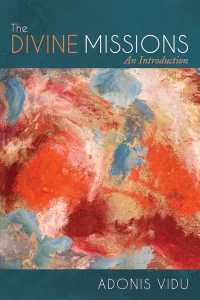 he Divine Missions: An Introduction (Cascade, 2021)
he Divine Missions: An Introduction (Cascade, 2021)
Christian theology affirms that the persons of the Son and the Holy Spirit are sent into the world to gather a scattered and rebellious humanity back to God. But how are we to understand these divine missions, given that the Son and the Spirit have already been present in the world from its foundation? Moreover, in what sense are they on a mission if they never leave the unity of the Trinity? In this volume, Vidu introduces us to the profound riches of this ancient and foundational doctrine. With ample illustration, he explains the technical concepts, the operative principles, and he clarifies the historical and contemporary debates. In the process, a constructive theology emerges where the category of divine missions frames topics such as the incarnation and life of Christ, his atoning death and ascension, the Pentecostal outpouring of the Spirit, the invisible indwelling of the Spirit, and finally the eschatological beatific vision.
T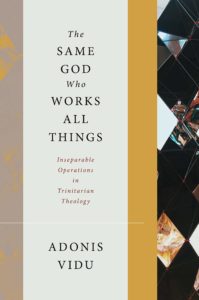 he Same God Who Works All Things (Eerdmans, 2021)
he Same God Who Works All Things (Eerdmans, 2021)
Classical Trinitarianism holds that every action of Trinity in the world is inseparable. That is, the divine persons are equally active in every operation. But then, in what way did the Father create the world through Christ? How can only the Son be incarnate, die, and be resurrected? Why does Christ have to ascend before the Spirit may come? These and many other questions pose serious objections to the doctrine of inseparable operations.
In the first book-length treatment of this doctrine, Adonis Vidu takes up these questions and offers a conceptual and dogmatic analysis of this essential axiom, engaging with recent and historical objections. Taking aim at a common “soft” interpretation of the inseparability rule, according to which the divine persons merely cooperate and work in concert with one another, Vidu argues for the retrieval of “hard inseparability,” which emphasizes the unity of divine action, primarily drawing from the patristic and medieval traditions.
Having probed the biblical foundations of the rule and recounted the story of its emergence in nascent Trinitarianism and its neglect in modern theology, Vidu builds a constructive case for its retrieval. The rule is then tested precisely on the battlegrounds that were thought to have witnessed its defeat: the doctrines of creation, incarnation, atonement, ascension, and the indwelling of the Spirit. What emerges is a constructive account of theology in which the recovery of this dogmatic rule shines fresh light on ancient doctrines.
A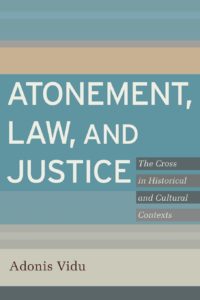 tonement, Law, and Justice (Baker, 2014)
tonement, Law, and Justice (Baker, 2014)
Tackling an issue of perennial interest in the Christian academy, Adonis Vidu provides a critical reading of the history of major atonement theories by exploring selected patterns, recurrent concepts, and attempts to discern broader themes. Vidu also offers an in-depth analysis of the legal and political contexts within which these atonement theories arose. The book engages the latest work in atonement theory and serves as a helpful resource for contemporary discussions.
Vidu suggests that the history of atonement thinking can be read as an ongoing conversation with the history of thinking about justice and the law. This is the only book that explores the impact of theories of law and justice on major historical atonement theories. Understanding this relationship yields a better understanding of atonement thinkers by situating them in their intellectual contexts. The book also explores the relevance of the doctrine of divine simplicity for atonement theory.
Students and scholars interested in understanding historic views of the atonement and their relation to theories of law and justice will value this work. It will also work well as a textbook for graduate courses in theology, ethics, and law.
T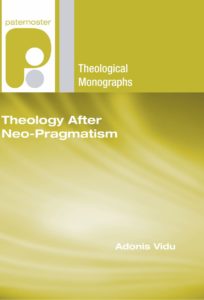 heology After Neo-Pragmatism (Wipf & Stock, 2009)
heology After Neo-Pragmatism (Wipf & Stock, 2009)
This book develops the thesis that Evangelical theology not only cannot afford to avoid engaging with the philosophy of neo-pragmatism, but it can also benefit from the proposals of some of its leading exponents, especially Donald Davidson. Three different themes run throughout the book: meaning epistemic justification, and ontology. How can theologians be confident of the meanings ascribed to religious beliefs in the wake of the dissolution of the very concept of meaning and of the analytic-synthetic distinction? Is there any rational fraction between our beliefs, religious or mundane, and some extra-linguistic reality? Is God something more than simply a symbolic construct associated with a certain manner of speaking? The surprising thought of Donald Davidson offers resources for Evangelical theology seeking hopeful answers to these troubling questions. Davidson’s rejection of the so-called ‘third dogma’ of empiricism, namely the dualism of scheme of content, should be welcomed by those defending theological ‘rationality’ and refuting relativism and incommensurability. Furthermore, his truth-conditional semantics can serve as a check against revisionist accounts of religious beliefs that flaunt the first-person point of view of the religious believer herself. These Davidsonian contributions to an Evangelical theology are, however, balanced by inherent inadequacies which require a theological supplement, which is also a creative proposal calling for: the continued significance of experience in theology beyond the myth of the Given; an understanding of the role of Scripture as both epistemic as well as dispositional; and finally an understanding of the nature of truth as located in the mind of God. Theology After Neo-Pragmatism is both an introduction to an influential philosophical trend, and a critical and constructive theological proposal which is at once scriptural and historicist, pragmatic and realist.
P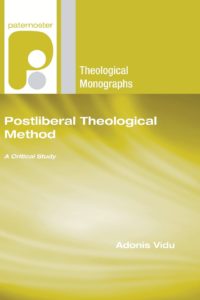 ostliberal Theological Method (Wipf & Stock, 2005)
ostliberal Theological Method (Wipf & Stock, 2005)
The postliberal theology of Hans Frei, George Lindbeck, Ronald Thiemann, John Milbank, and others is one of the more influential contemporary options. This book focuses on several aspects pertaining to its theological method specifically its understanding of background hermeneutics, epistemic justification, ontology, the nature of doctrine, and finally Christological method. Postliberal Theological Method is a fresh, critical analysis of one of today’s most influential theological movements. Drawing on recent thinking in analytic philosophy, particularly Donald Davidson’s work on truth and meaning, Vidu raises questions about the linguistic turn in the theology of the postliberal theologians.
